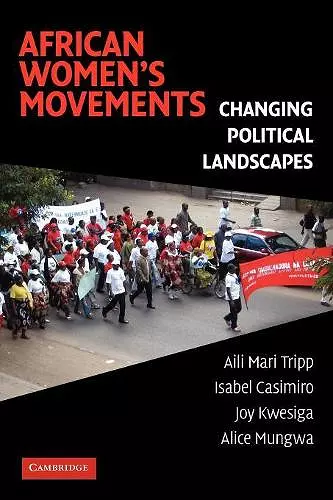African Women's Movements
Transforming Political Landscapes
Aili Mari Tripp author Isabel Casimiro author Joy Kwesiga author Alice Mungwa author
Format:Paperback
Publisher:Cambridge University Press
Published:10th Nov '08
Currently unavailable, and unfortunately no date known when it will be back
This paperback is available in another edition too:
- Hardback£90.00(9780521879309)

This book examines the causes of women's unprecedented success in African politics after the 1990s.
Women entered the political scene in Africa after the 1990s. This book examines the convergence of factors behind women's political success, including the emergence of autonomous women's movements, the availability of new resources to advance women's status, and the end of civil conflict.Women entered the political scene in Africa after the 1990s, claiming more than one third of the parliamentary seats in countries like Mozambique, South Africa, Tanzania, Uganda, and Burundi. Women in Rwanda hold the highest percentage of legislative seats in the world. Women's movements lobbied for constitutional reforms and new legislation to expand women's rights. This book examines the convergence of factors behind these dramatic developments, including the emergence of autonomous women's movements, changes in international and regional norms regarding women's rights and representation, the availability of new resources to advance women's status, and the end of civil conflict. The book focuses on the cases of Cameroon, Uganda, and Mozambique, situating these countries in the broader African context. The authors provide a fascinating analysis of the way in which women are transforming the political landscape in Africa.
'This book counters the mainstream media image of Africa as a continent mired in the legacies of colonialism. The activist scholars writing here inspire us to recognize the impact of women's transformative leadership in policy making and bring a message of women's political activism as the urgent agency of social change.' Peggy Antrobus, Development Alternatives with Women for a New Era (DAWN)
'Written by a distinguished team of African and American academics and practitioners, this outstanding book analyzes the ways in which women activists and politicians have been transforming politics in Africa since the early 1990s. With a particular focus on Uganda, Mozambique and Cameroon, the book nonetheless draws illuminating comparisons across countries and subregions. Finding that the most important single determinant of new policies has been autonomous women's movements, the book addresses several paradoxes such as differences in legislative outcomes and the variable role of democratization. African Women's Movements makes a significant contribution to our understanding of emerging African politics, women in politics and the role of social movements in Africa and will be essential reading for scholars and activists alike.' Gretchen Bauer, University of Delaware
'An indispensable analysis of gender politics in Africa. This pathbreaking comparative analysis of African women's movements focuses attention on the importance of associational autonomy and heterogeneity for the project of realizing gender rights. Theoretically smart yet engagingly written, this book is sure to became a standard text in a wide range of courses.' Shireen Hassim, University of the Witswatersrand, Johannesburg
'This sweeping book investigates the explosion of women's participation and activism in Sub-Saharan Africa in the 1990s and 2000s. It analyzes how strong and independent women's movements promoted policy changes toward gender equality in one-party states and in the aftermath of civil wars; why unprecedented numbers of women entered political office; and how state institutions were reformed to address women's concerns. Explaining why some policy changes (such as quotas in parliament) are less controversial than others (such as family law and land rights), it shows that women's equality is easier to achieve in state and market relations than in the domain of family, clan, and community. By unravelling puzzles of African gender politics, the authors advance theories of comparative politics and our understanding of state-society interactions under the influence of international norms.' Mala Htun, New School for Social Research
'This path-breaking book draws on a wide range of gender and politics scholarship as well as careful empirical research to explore important questions about the role of women's movements in politics and policymaking in Africa. In a sophisticated comparative analysis, the authors, who are all experts in their field, show us how women's movements and new international norms interacted with the changing political landscape in Africa to produce a number of women-friendly reforms. By significantly advancing our understanding of these complex phenomena, this book will make an important contribution to the study of gender and politics in Africa as well as to comparative politics, gender studies and African studies more generally.' Georgina Waylen, The University of Sheffield
- Winner of Choice Outstanding Academic Title 2009
ISBN: 9780521704908
Dimensions: 229mm x 152mm x 16mm
Weight: 420g
280 pages